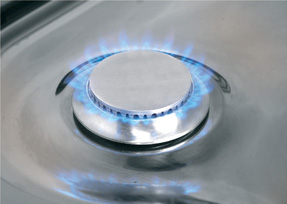Most of the time spent in the kitchen goes in cooking meals. There are a number of ways to ensure that cooking in the kitchen is carried out in a more energy efficient manner.
Selecting The Right Method to Cook:
The first step in cooking efficiently is to match the right method of cooking with the dish to be prepared. Cooking methods that minimize the area to be heated helps in reducing the amount of heat required. For example, using a toaster is considered more efficient than toasting a slice of bread in an oven. The fine balance is selecting a method that is energy efficient and does not compromise on the quality of food being delivered. A microwave for example may be highly efficient but is considered at times to compromise on the quality of food that is being prepared.
Selecting The Right Sized Dish to Get The Job Done:
Selecting
the right pan size for a dish and matching it accurately with the size
of the cook top is also crucial in ensuring that there is no waste of
energy. Using a small sized pan on an over-sized burner can lead to as
much as a 40% loss of energy. The pan shape and the mode of cooking also
need to be taken into consideration. A slightly concave pan is ideal
for a gas stove top while a flat bottom pan that increases the contact
area is essential for an electric stove top.
The Effect
Various Cookware Has on Cooking:
Using cookware made of high
conductivity materials will ensure that less time is taken to heat the
pan and therefore proves to be more energy efficient in the process.
Utensils made up of high conductivity materials ensure that food is
cooked more evenly. Conductivity depends upon the mode of cooking. On a
regular stove, copper pans conduct heat more efficiently than those made
of other materials. Glass and ceramic pans heat faster in ovens than
metal ones. In fact, you can reduce heat requirements by 25°F.
Maintaining
Your Stove’s Burner:
Keeping the burner clean is crucial to
ensure that it works efficiently and effectively. A blackened burner,
which has lot of burnt food on it, can absorb heat reducing burner
efficiency in the process. When the burner is shiny, it is able to
reflect heat onto the pans more easily.
Planning Your
Meals:
Energy efficient cooking requires considerable
preplanning. Frozen foods should be defrosted by moving the food article
from the freezer to the main fresh food compartment. Try to reduce the
amount of pre-heat time in conventional ovens. The self cleaning option
available in some ovens should be used sparingly and only after a
meal has been cooked so that the residual heat can be utilized.
...Read more
Close
















